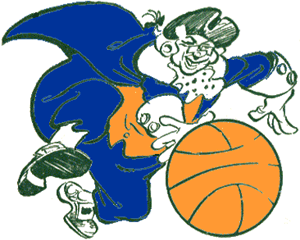Of "Knickerbockers" and "Yankees"
Location: New York, New York
Year: 1809
The term "Knickerbocker," originally a family name, refers to a member of the old Dutch mercantile aristocracy of New Amsterdam, and today, more generally, to all New Yorkers, particularly residents of New York City.
The word came into popular use when Washington Irving published his first major work, A History of New-York from the Beginning of the World to the End of the Dutch Dynasty, by Diedrich Knickerbocker, in 1809. A satire about poltroonery and bad manners, the fictional narrator, historian Diedrich Knickerbocker presented himself as a scion of the old Dutch families of New York.
The frontispiece of the book showed Knickerbocker as a crusty old Dutchman wearing a tricorne hat and calf-length breeches with hose of a style later called knickerbockers or just knickers.
The New York Knicks (nee Knickerbockers) basketball team was founded in 1947. Their first logo and mascot was "Father Knickerbocker."
But there is another sports team in New York that also takes its name from an old Dutch slang expression. Back in the 1600s, the Knickerbockers of New Amsterdam called any foolish person by the name "Jan Kaas" ("John Cheese"), much in the way we might refer to someone today as "Casper W. Milquetoast," "John Q. Public" or a "Nimrod" under varying circumstances.
As an insult, Jan Kaas survived the transformation of New Amsterdam into New York, and during the Revolutionary War, the British who occupied New York got a great deal of fun out of referring to the colonists (Patriot and Loyalist alike) as Jan Kaas, since they considered all New World settlers to be uncouth rustics.
Jan Kaas (pronounced "Yahn Case" by the Dutch but mispronounced "Yan Kees" by the English) became a synonym for New Yorkers. When some British wag set a silly drinking verse to music, "Yankee" and "Yankee Doodle" became a disparaging name for all Patriots when he "went to London riding on a pony."

But John Cheese's storied life was just beginning. In the 80 or so years between the Revolutionary War and the Civil War, the term "Yankee" became more strictly regional, referring not to New Yorkers, primarily, but to New Englanders, particularly. During the Civil War, the term was applied to all Northerners, regardless of where they came from (especially by Southerners, who usually prefixed "Yankee" with "Damn"). And during the First World War, "Yankees" or "Yanks" became one of the two generic names Europeans applied to American soldiers --- to the anger and chagrin of those "Yankees" from below the Mason-Dixon Line, whose grandfathers and great-grandfathers had fought for the South --- "Doughboys" was the other. In World War II, the terms were "Yanks", "Joes" or "GIs."
John Cheese came back home to New York in 1915. Colonel Jacob Ruppert, the owner of the Knickerbocker Beer Brewing Company, bought the struggling New York Highlanders baseball team for a song.
Ruppert considered renaming the team the "Knickerbockers," but, faced with a rising Temperance Movement, and concerned that the public's associating his beer brand with his baseball brand might negatively impact the gate (Prohibition was only four years away), Ruppert (who obviously knew some New York history), renamed his team the "Yankees." When the U.S. entered World War I, the name became the acme of Americanism, and Ruppert's team went on to be the best ever in baseball. So there we have it.






Awesome history!
ReplyDeleteHuzzah brought me here! Huzzah! Thanks Google!
ReplyDeleteThis is great information.
ReplyDelete